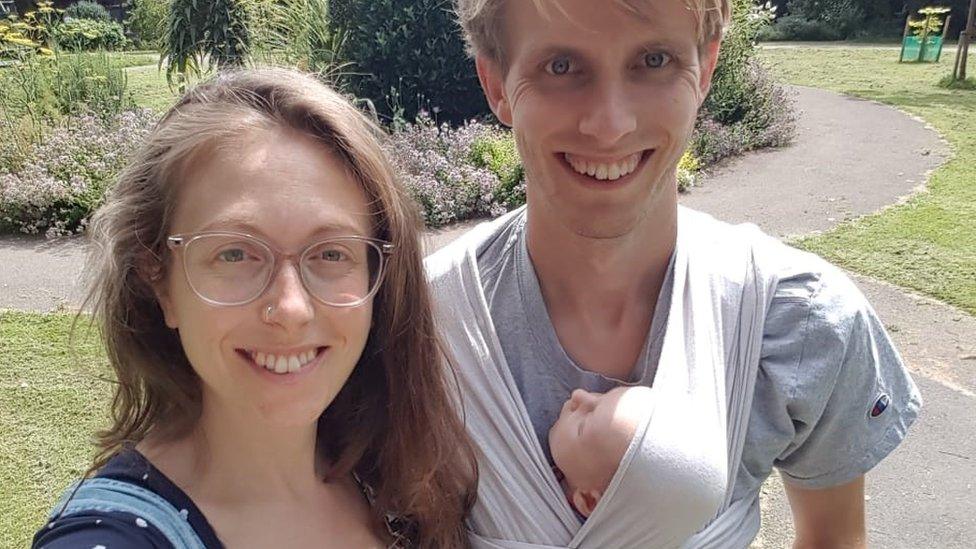Pregnancy in lockdown: The babies born into a pandemic
- Published
Portrait photographer Nina Raingold met five mothers who have experienced the challenges of giving birth during Covid restrictions in the UK.
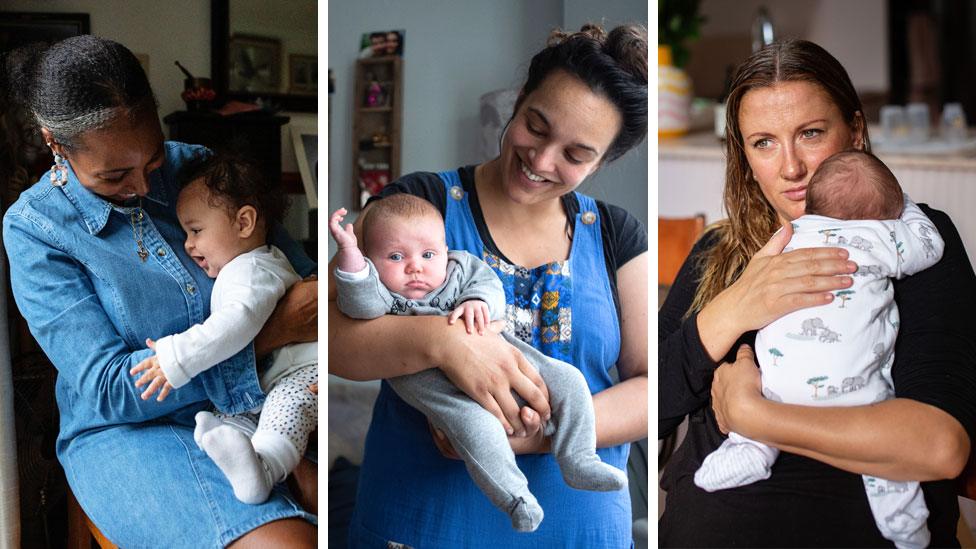
Last year, Covid rules meant some expectant mothers faced being alone for baby scans, appointments and giving birth.
"As a mother and a photographer whose work has mainly focused on young families, I could barely imagine how frightening these circumstances must have been for pregnant women and new mothers, as well as their families," Bristol-based Raingold says.
In December 2020, the NHS issued guidance saying pregnant women should be allowed to have one person with them during these times.
It added the chosen individual, whether partner, family member or friend, should be viewed by hospitals as "an integral part" of the woman's care, rather than a mere visitor.
The photographer shot portraits of the five women in their homes, and found out about their experiences of isolation and the medical and emotional support they received.

Amy and her daughter Elowen
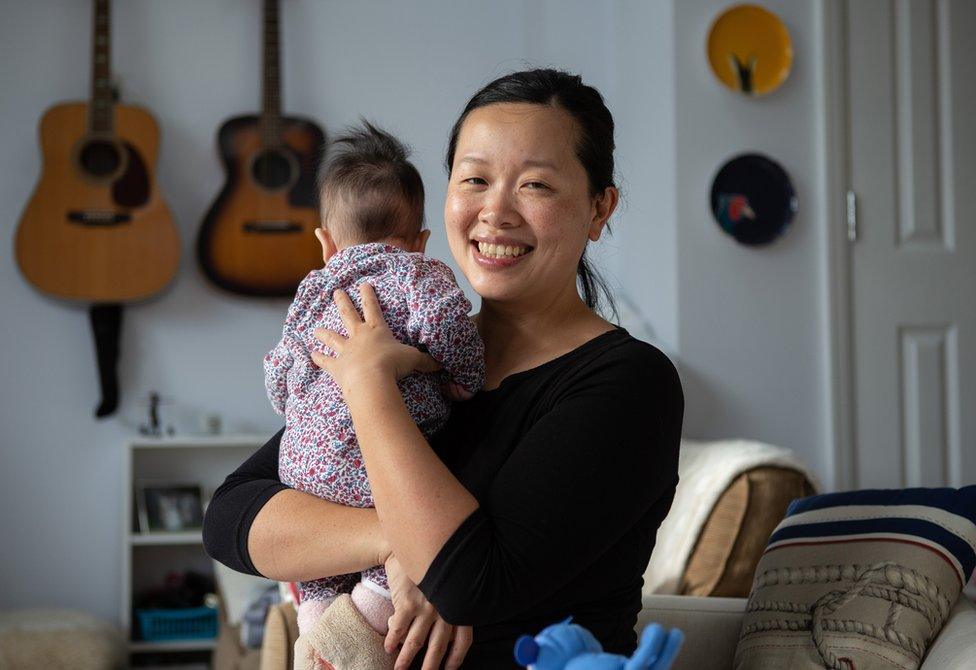
"When the pandemic hit, I was 18 weeks' pregnant.
"I was sent to work from home immediately, which is something you don't expect in such a clinical job; I work in a children's hospital doing brain scan tests.
"Things were a bit unknown for pregnant women, and there were cases of Covid affecting pregnant women in other countries.
"I felt guilty for not being at work because being pregnant isn't being sick, is it? I felt I was abandoning work.
"[My partner] Chris couldn't come to a few of my scans which was a real shame because it's very much a thing you do together.
"In the end, I had an emergency C-section which was really traumatic and the recovery was really tough.
"Chris was allowed to be with me on the labour ward but I was in a high-dependency unit for one night after the surgery, because Elowen and I both had temperatures.
"He wasn't allowed to stay. That was really tough. I couldn't even twist to pick her up and you don't really know what you're doing as a new mum with breastfeeding, or anything.
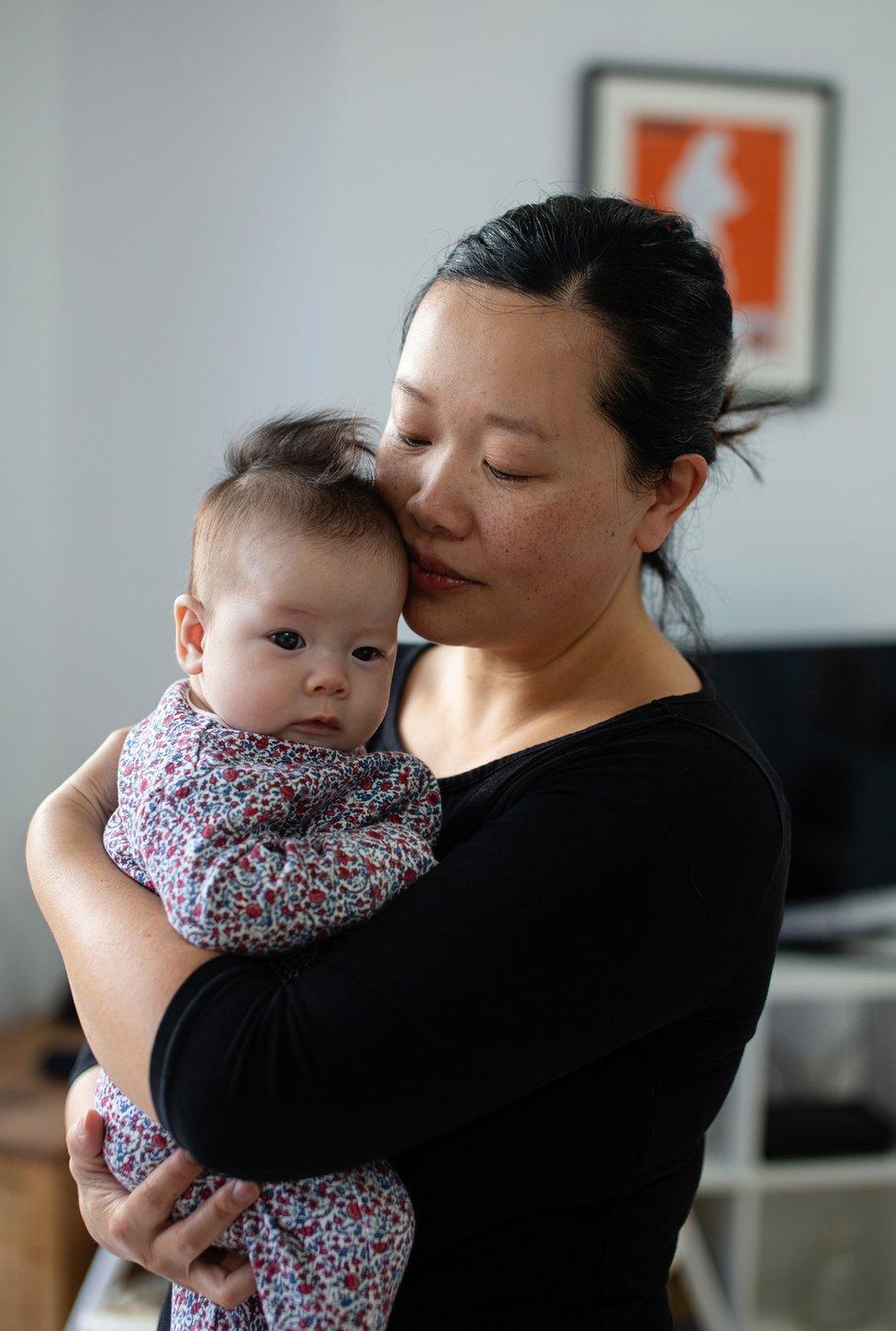
"I joined an antenatal class which was really informative but it was a virtual class, so we lost some of the social aspects.
"I keep seeing lots of postnatal classes advertised but I don't want to get public transport to go to them, so there are a lot of hurdles.
"In normal times, it would be much simpler going out and hopping on a bus and meeting new mums.
"Most new mums are probably in the same boat; they want a bit of company and support.
"With Elowen's development, I find myself thinking: Is that normal? I don't know. I've got nothing to compare to.
"It's been hard not having people around. Elowen hasn't even met my dad.
"The grandparents are itching to get their hands on her! When she's a bit older it would be nice for her to see more people and get used to hustle and bustle."

Jo and her daughter Olive
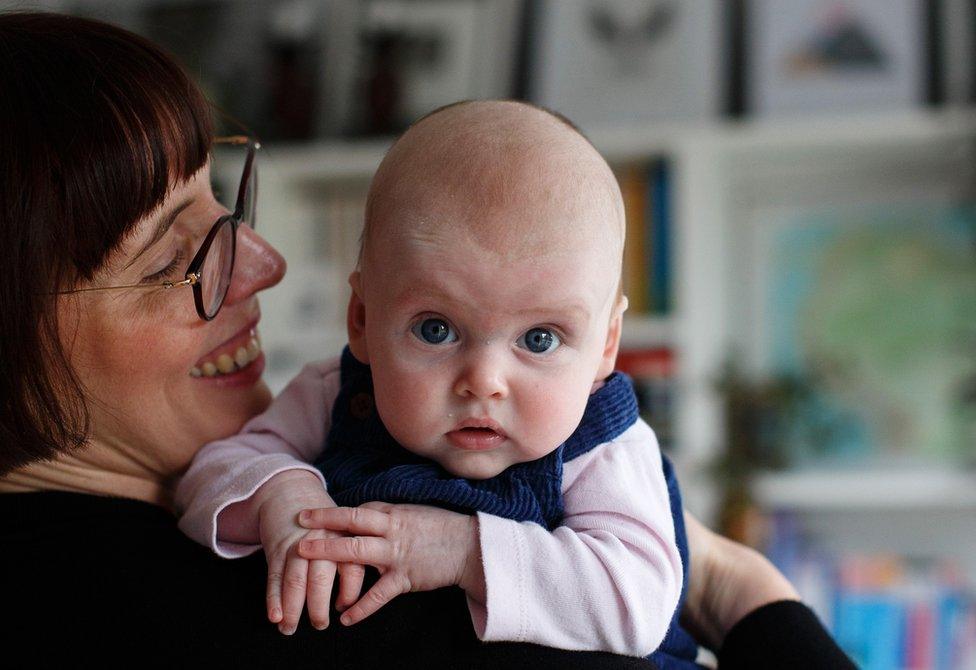
"The hardest part about being pregnant in lockdown was that my husband Pete couldn't come to my appointments or scans, and it's quite scary to do that by yourself.
"We were always a bit worried that one of us would get sick; it put a fog of anxiety over the last trimester.
"Pete couldn't be with me for some of my labour. I had to go into the maternity triage and he wasn't allowed in.
"All the stuff you prepare for labour is with your birth partner; I hadn't planned to do 45 minutes of it in the waiting room on my own!
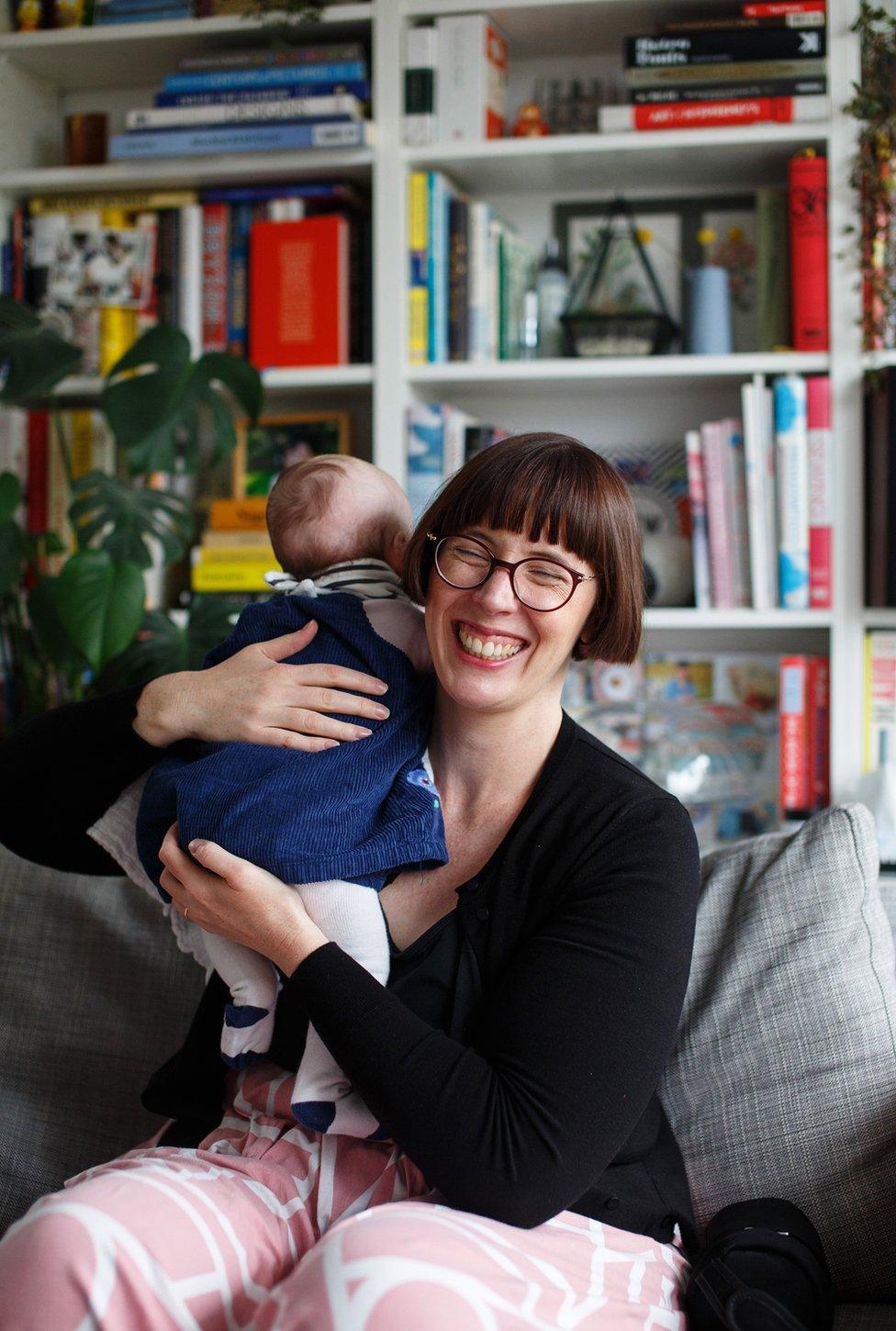
"[Afterwards at home], it was just me and Pete and we couldn't have anyone over.
"I would say it's been a really isolating time; it hasn't been the road that we were hoping for in terms of having a first baby.
"I did a new parent group on Zoom and if we'd met in a room we probably would have gone for a cup of tea afterwards.
"I find it hard for my mood because it feels quite overwhelming.
"You're not meant to learn and do it all alone; it takes a village."

Naomi and her son Akirou
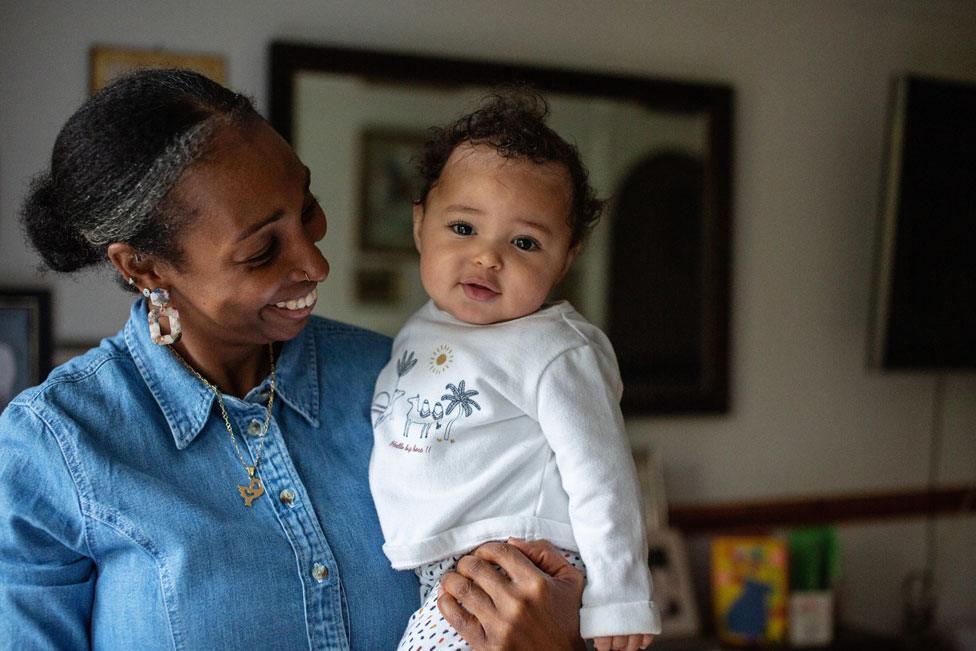
"We were in complete lockdown on the day I gave birth.
"It was so quiet getting to the hospital. Looking out of the window, there was nobody on the streets.
"I thought maybe I wanted to give birth at home because of the virus, but they said I had to have the baby in the labour ward.
"The virus was so new and they didn't know what was going to happen.
"They just had the high numbers of deaths from all the other countries. I remember it being a very surreal time.
"So many people were dying every day. To have that on your mind and then to go to hospital where you'll be in contact with so many different people was a scary thought.
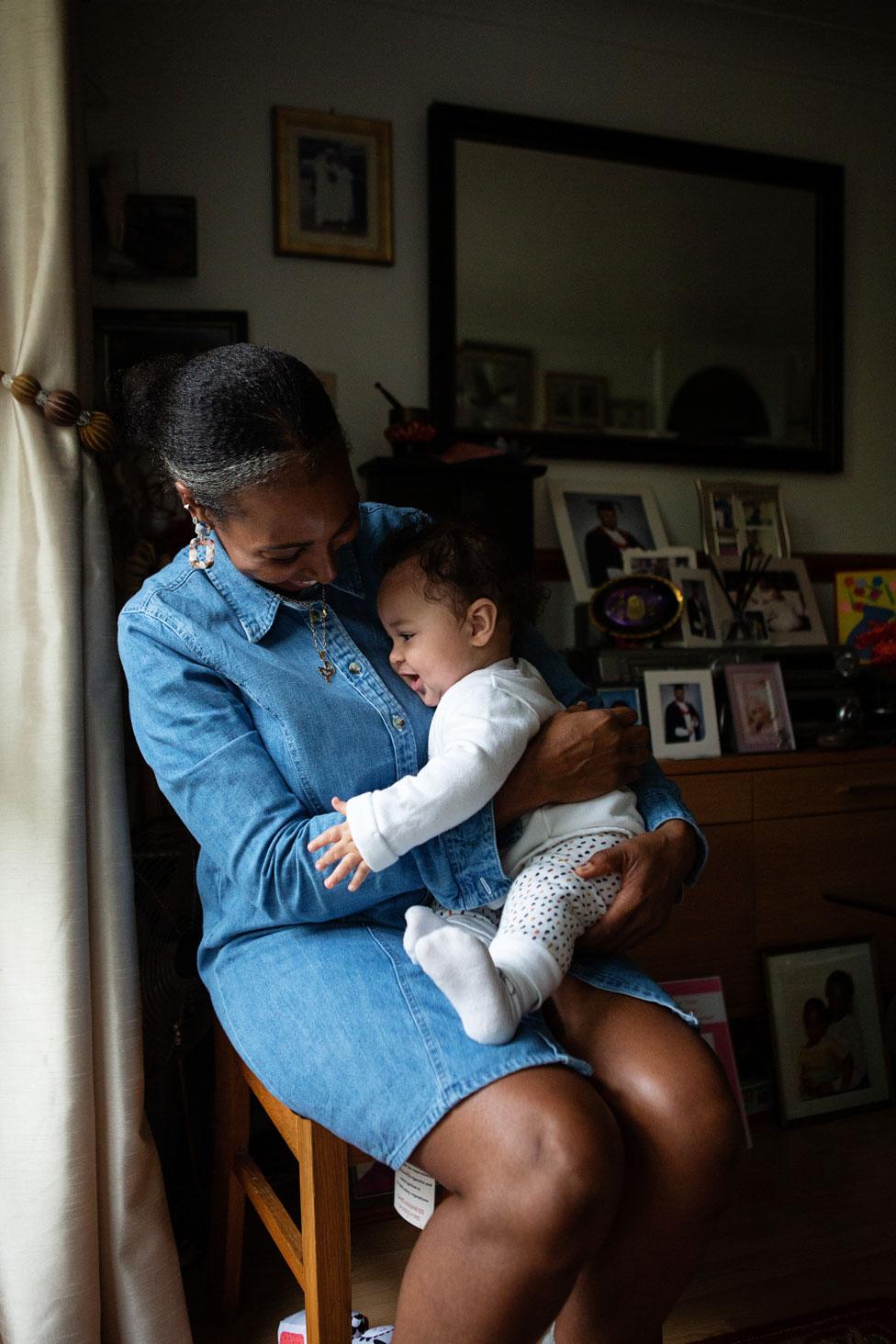
"My partner came with me in the ambulance and was able to stay until I gave birth.
"He stayed for an hour or two and then he was told to go. It was a bit sad. I think he was a bit upset about it.
"I was in hospital for three days. I developed this sense of anxiety I had never experienced before.
"I was cautious about who came to speak to me. Were they wearing the full PPE? How close were they? Were they wearing a mask?
"I wanted to relax and enjoy my baby and even talk to the mother in the cubicle next to me. But I was really nervous.
"Prior to the pandemic, I thought my older child would be at nursery and I would have time to bond with the baby and go to mother and baby groups.
"But it was nothing like that at all. Everything was closed. And the nursery was closed.
"Sometimes I had a really bad night and I just wanted to speak to someone else who had an equally bad night and could understand what I was going through - that was all gone."

Steph and her daughter Nora
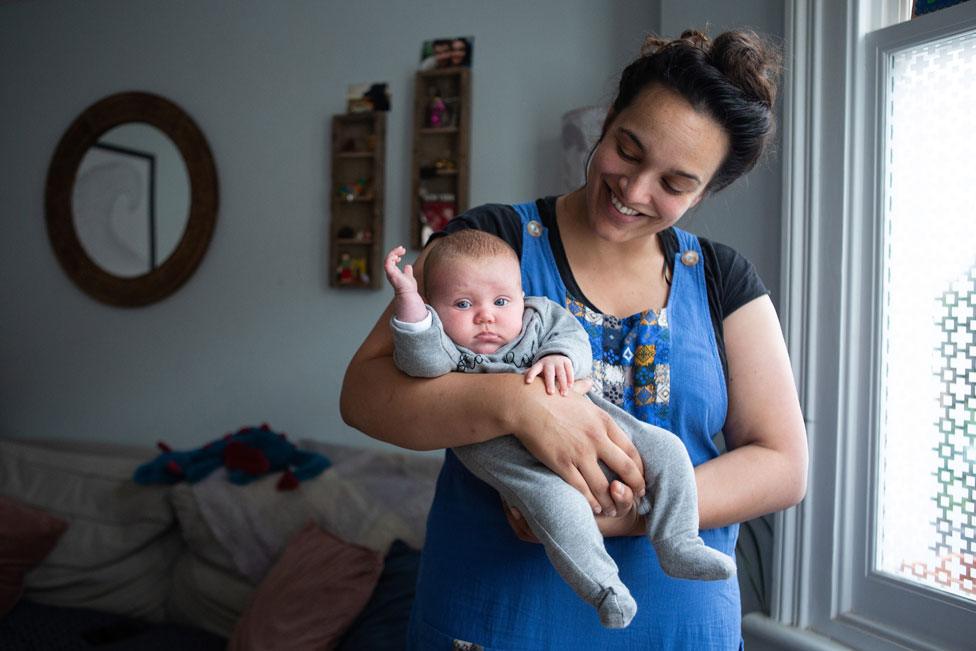
"I was five months' pregnant when the pandemic hit.
"I remember after Boris's first address - when we were told that's it, we're under lockdown - I felt really lonely.
"I thought: 'This is how it's going to be for the next four months, every day by myself'.
"I had a little cry. But then I thought about all the other women who were going to be pregnant in the pandemic and I thought my pregnancy will be fine.
"[My partner] Joe wasn't allowed to come to the hospital appointments and there were some scans he didn't see at all, which was disappointing for us.
"What worried me most was being in the hospital and potentially getting coronavirus.
"I wasn't worried about going to the appointments by myself because I saw all the other women also by themselves.
"I guess I felt solidarity with these women.
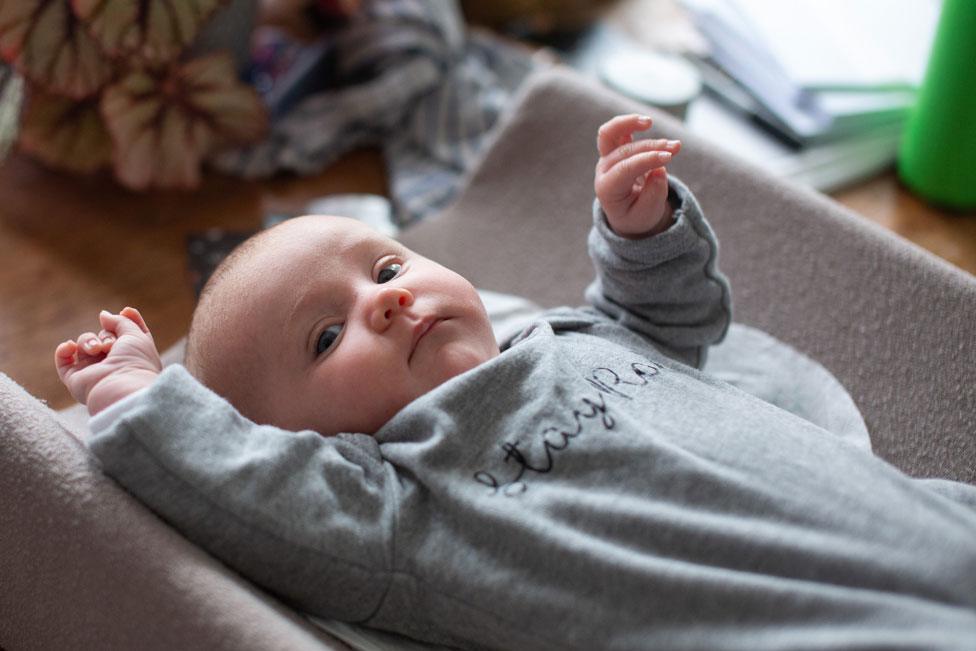
"The worst thing in the whole pregnancy was that after an incredibly long labour, Joe had to leave the hospital an hour after I had given birth.
"We did skin-to-skin contact with the baby with me, and then with him, and then he had to go.
"I had to stay with her for two days by myself. If he'd have been there, I think I would have been fine.
"I was dealing with it because all the other women were dealing with it, but it didn't feel good at all.
"Being pregnant during the pandemic wasn't actually that bad because we had some lovely 'us time', much more than we would have done before having a baby.
"If you're getting on with your partner, then actually you go into a lovely little cocoon.
"But it's sad for your partner not to be with the baby immediately."

Tash and her son Ziggy
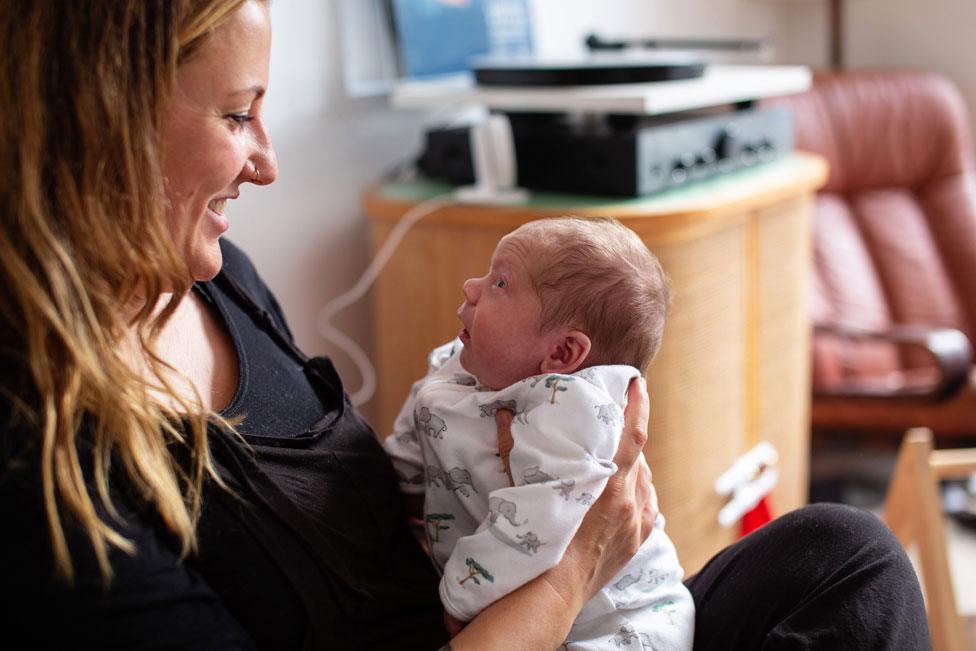
"When I found out I was pregnant, the news of coronavirus was becoming more prevalent in the UK.
"I knew it would be a high-risk pregnancy because I had diabetes in my previous pregnancy and because of the small gap between my pregnancies.
"Also, I had postpartum depression. I've had depression my whole life but it's worse when I'm pregnant.
"I was absolutely exhausted this time round. It just hit me like a ton of bricks.
"Because of my gestational diabetes I got a text message from the NHS saying: 'We have discovered you are one of the most vulnerable people'.
"All the text said was: 'Stay indoors, do not leave, do not eat in the same kitchen as other people'.
"It was a long list of things that I can't do.
"You can open a window. That's what I was given basically! The option to open a window.
"I just burst into tears. I had a total meltdown.
"I knew I was going to be high risk for mental health during my pregnancy but this was another level of stress I didn't need.
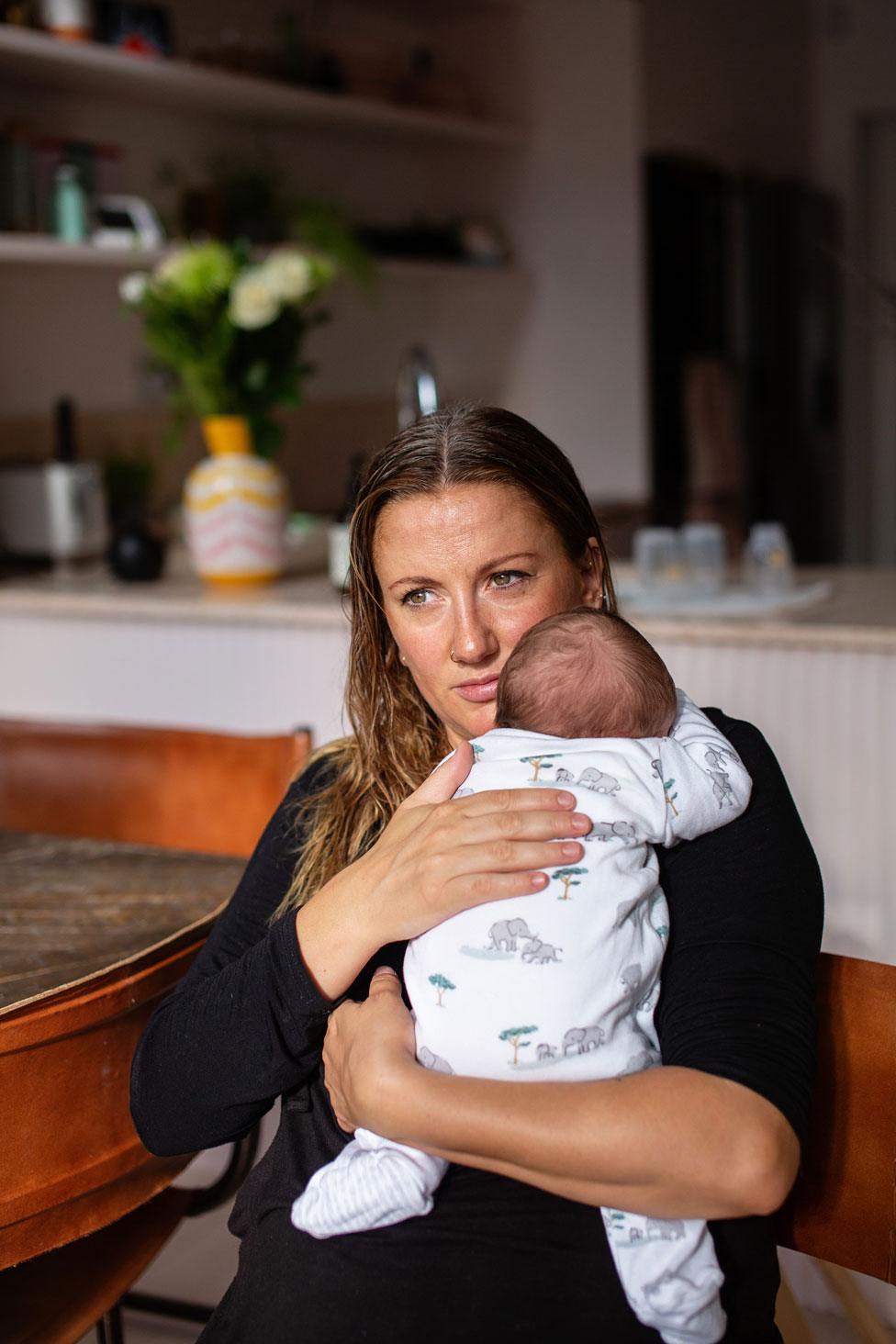
"For six weeks [when I was shielding], I didn't leave my front door. [My partner] Nick got all the post, all the shopping and disinfected everything.
"My mental health really started to suffer. I would get really scared every time I went to the hospital.
"I was developing pre-eclampsia. From about 20 weeks, they kept asking me to come back to the hospital.
"Nick was really sad not to be able to support me and not to see any of the scans.
"I was going through all the appointments, all the diagnoses, all the bad news and the scans on my own.
"The pandemic has had a profound effect on my relationship with my children and my ability to bond with my youngest son.
"I've recently joined a WhatsApp group for mothers with mental health issues and this has helped normalise some of my feelings around failure and detachment."

Nina Raingold's project on new mothers during the pandemic, external will continue throughout 2021 and she is looking for more people to speak to and photograph. Contact details, external are on her website.
- Published23 February 2021
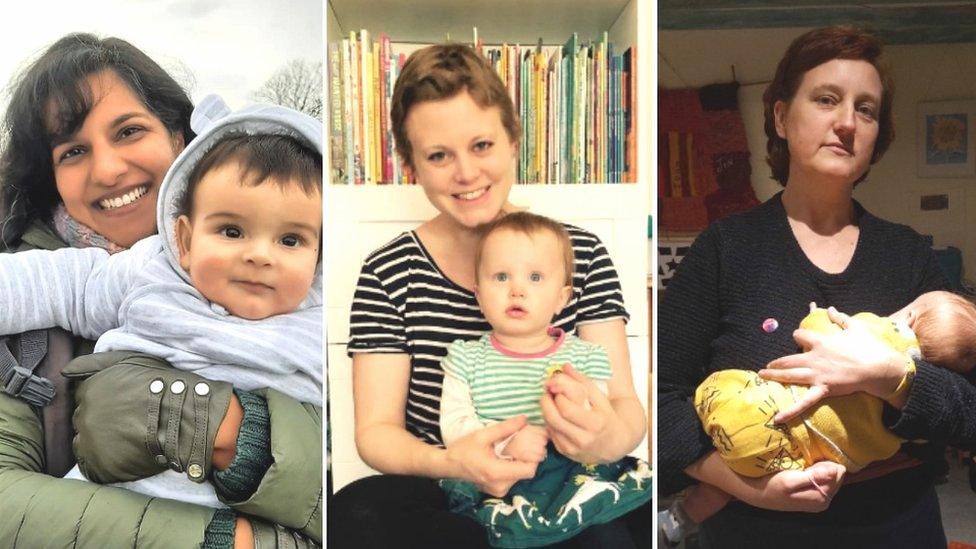
- Published12 February 2021
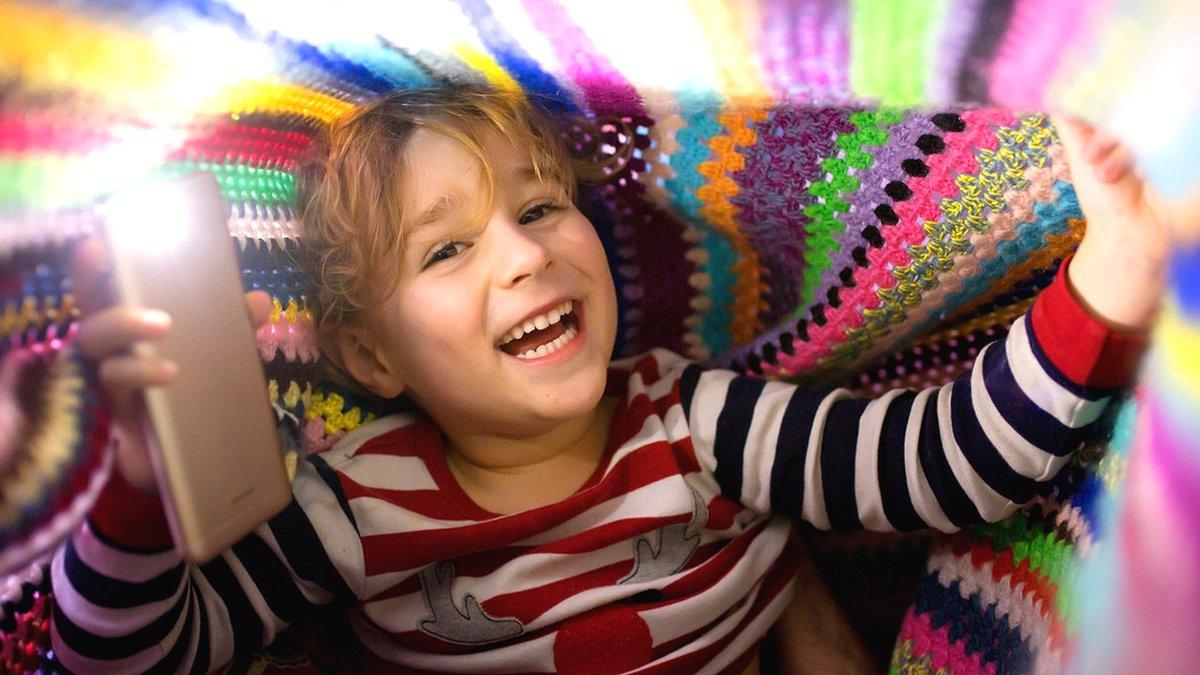
- Published27 February 2021
